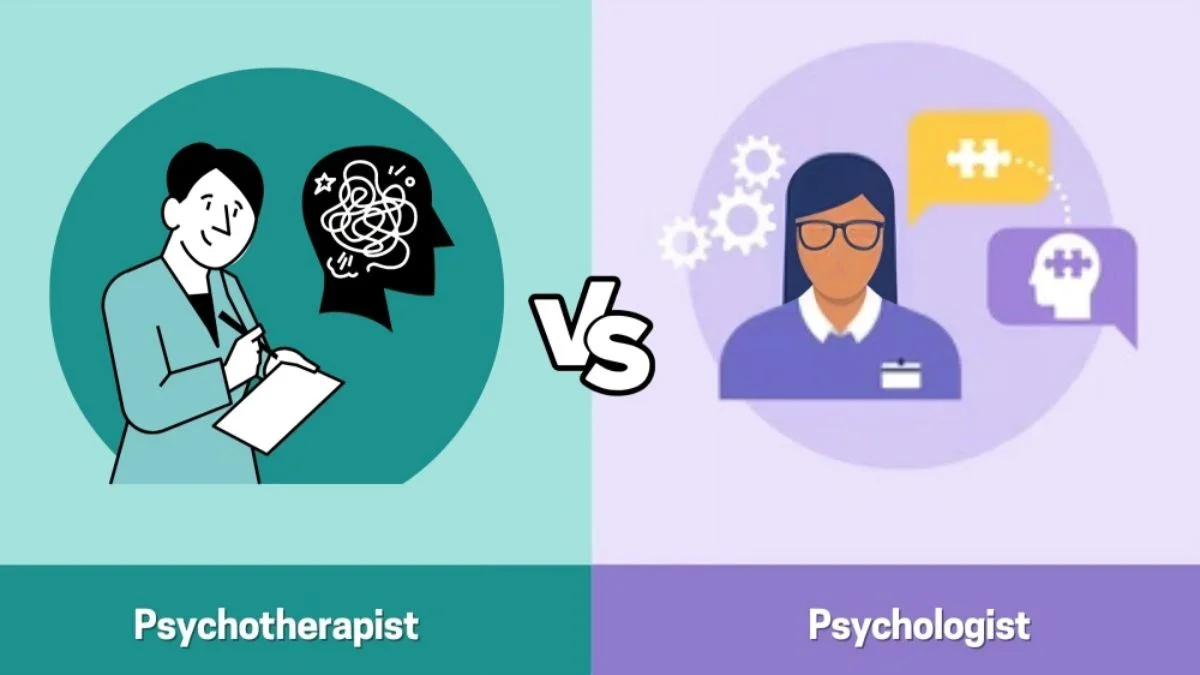HEALTH AND FITNESS
Psychotherapist Vs. Psychologist: Similarities And Differences

The fields of psychotherapy and psychology often intersect, leading to confusion about the roles and qualifications of psychotherapists and psychologists. This article explores the definitions, educational requirements, job responsibilities, and salary expectations for both professions in Canada.
While there are similarities between psychotherapists and psychologists, such as their focus on mental health and well-being, there are also key differences in their educational paths, scope of practice, and diagnostic capabilities. Understanding these distinctions is crucial for those considering a career in mental health or seeking professional help.
Both psychotherapists and psychologists play vital roles in addressing mental health needs, but their specific approaches and areas of expertise can vary significantly. This comprehensive overview aims to clarify the unique aspects of each profession while highlighting their shared commitment to improving mental health outcomes.
Table of Contents
What Is a Psychotherapist?
A psychotherapist is a mental health professional who provides talk therapy to address various psychological conditions. This field encompasses a range of practitioners, including nurses, licensed social workers, mental health counselors, psychiatrists, and both clinical and counseling psychologists.

These professionals employ evidence-based techniques to assist individuals in overcoming emotional, psychological, and behavioral challenges. Their expertise extends to treating conditions such as anxiety and depression and helping with career and relationship issues. Psychotherapists tailor their approach to each client’s needs, potentially utilizing methods like cognitive behavioral therapy, art therapy, or play therapy.
Typical psychotherapy sessions last between 30 to 60 minutes. The initial meeting, known as an intake session, is usually longer, often exceeding an hour. This extended first appointment involves completing the necessary paperwork and gaining a comprehensive understanding of the patient’s background and therapeutic goals.
Psychotherapists work in diverse settings, including educational institutions, hospitals, clinics, and corporate environments. They offer therapy to individuals, groups, families, and children, adapting their methods to suit each context.
Psychotherapist Salary in Canada
In Canada, psychotherapists earn an average annual salary of $86,200, which translates to an hourly rate of $44.21. Those just starting their careers can expect to make around $73,083 per year. On the other end of the spectrum, highly experienced psychotherapists may command salaries up to $127,539 annually. This range reflects the varying levels of experience, specialization, and location within the Canadian job market for psychotherapists.
Psychotherapist Job Requirements in Canada
To work as a psychotherapist, you typically need to meet the following criteria:
Education:
- A bachelor’s or master’s degree in counseling, therapy, mental health, psychology, or a related social service field is essential.
- A master’s degree in the specific therapy field is mandatory for specialized roles such as art therapist, music therapist, or dance therapist.
Experience:
- A period of supervised clinical work with clients may be required, depending on the specific role and location.
Professional Affiliations:
- Employers usually require membership with a provincial or federal association.
Licensing and Registration:
- In Nova Scotia and New Brunswick, counseling therapists must be registered with a regulatory body.
- Quebec requires a permit to practice psychotherapy.
- Ontario mandates registration with the appropriate regulatory body for psychotherapy practice.
- In Quebec, marriage and family therapists, psycho educators, sexologists, and criminologists must be registered with a regulatory body.
These requirements ensure that psychotherapists possess the necessary education, skills, and professional standing to provide effective and ethical care to their clients.
What Is a Psychologist?
Psychologists are professionals who study human cognitive processes and behavior. Their career paths can be diverse, leading to various positions in different environments. Some psychologists focus on academic research, while others pursue careers in higher education teaching or practicing psychotherapy.

Both counseling and clinical psychologists incorporate psychotherapy into their practice, but their approaches differ slightly:
- Counseling Psychologists: These professionals help patients identify and manage problems in their lives through counseling sessions.
- Clinical Psychologists: They focus on diagnosing and treating more complex mental health disorders.
Many clinical psychologists choose to specialize in specific research areas or psychotherapeutic practices. For instance, some may concentrate on working with individuals who have ADHD, while others might focus on pediatric populations or people struggling with eating disorders.
The role of a clinical psychologist can extend beyond direct patient care. Depending on their area of expertise, they may also:
- Supervise psychology students
- Provide consulting services to other mental health professionals
- Offer expert advice to businesses on psychological matters
This versatility in the field of psychology allows professionals to tailor their careers to their interests and strengths while addressing various mental health needs in society.
Psychologist Salary in Canada
In Canada, psychologists earn an average annual salary of $102,816, which equates to an hourly rate of $52.73. New entrants to the field can expect starting salaries around $84,001 per year. As psychologists gain experience and expertise, their earning potential increases, with the most seasoned professionals commanding up to $127,200 annually. This salary range reflects variations in factors such as experience level, specialization, location, and type of practice within the Canadian psychology job market.
Psychologist Job Requirements in Canada
Educational Requirements:
- Doctoral degree in psychology: Required to use the title “Psychologist” in Prince Edward Island, New Brunswick, Quebec, Ontario, Manitoba, and British Columbia.
- Master’s degree in psychology:
- Sufficient for the “Psychologist” title in Newfoundland and Labrador, Nova Scotia, Saskatchewan, Alberta, Northwest Territories, and Nunavut.
- Required for the “Psychological Associate” designation in Prince Edward Island, Ontario, Manitoba, and British Columbia.
Practical Experience:
- Most jurisdictions require a period of supervised practical experience.
Examinations:
- The Examination for Professional Practice in Psychology (EPPP): A written test is required in most provinces.
- Oral examinations and board interviews: Mandatory in some provinces.
- Ethics and jurisprudence exams: May be required in certain jurisdictions.
Registration:
- All provinces, Northwest Territories, and Nunavut require registration with a regulatory body.
Specialization:
- Psychologists can specialize in particular areas through additional training and experience.
These requirements ensure that psychologists meet the necessary standards of education, practical experience, and professional knowledge to practice effectively and ethically in their respective jurisdictions. Aspiring psychologists should verify the specific requirements in their intended area of practice, as they may vary by location and specialization.
Similarities Between Psychotherapists and Psychologists
The terminology in mental health can be confusing, making it challenging to distinguish between different professions. A psychotherapist is defined as someone who practices psychotherapy, a description that encompasses various professions, including clinical and counseling psychologists. While not all psychotherapists are psychologists, many clinical and counseling psychologists do practice psychotherapy.
Shared Attributes of Psychologists and Psychotherapists:
- Both may offer talk therapy to individuals and groups
- They aim to enhance patients’ mental health and overall well-being
- Both can treat conditions such as anxiety, depression, and other mental health issues
- A graduate degree is required for both professions
- State-specific licensure is necessary for practice
- Both utilize expert listening skills, empathy, and creativity to assist people
Distinguishing Features of Psychotherapists and Psychologists: It’s important to note that not all psychotherapists are psychologists, and vice versa. Psychology generally demands a higher level of education, as licensed psychologists typically need doctoral degrees.
Differences Between Psychotherapists and Psychologists
- Educational requirements: Clinical and counseling psychologists must attain a doctoral degree, while psychotherapists typically need a master’s degree
- Scope of work: Psychologists can conduct academic research and work in laboratory settings, whereas other psychotherapists primarily provide talk therapy to clients
- Focus of practice: Psychotherapists are more likely than clinical psychologists to concentrate on talk therapy
- Diagnostic capabilities: Clinical psychologists can perform assessments and make complex diagnoses, while psychotherapists generally diagnose and treat more common mental health conditions
- Treatment approaches: Clinical and counseling psychologists and psychotherapists may employ different mental health treatment methods based on their specialty, degree, or training
Marcia Buhler, a Registered Psychologist with the College of Alberta Psychologists, offers expert online psychologist consultation services specializing in child psychology and peaceful parenting. With over 20 years of experience and a Master’s degree in Marriage and Family Therapy, Marcia provides evidence-based, attachment-focused counseling to help parents better understand their children’s emotional needs and behaviors. Her gentle, sensitive approach creates a safe and trusting environment for families to heal, learn, and thrive.
Marcia’s extensive training in various parenting programs, coupled with her expertise in child development and play therapy, makes her an invaluable resource for parents seeking to enhance their relationships with their children. By offering online consultations, Marcia makes her wealth of knowledge and compassionate guidance accessible to families, regardless of their location, helping them navigate the challenges of parenthood with confidence and empathy.
Looking for more? Explore our blog for valuable tips and the latest updates!
-

 GENERAL2 months ago
GENERAL2 months agoUncovering the World of кинокрадко: The Dark Side of Film Piracy
-

 GENERAL1 month ago
GENERAL1 month agoUnveiling the Art of преводсч: How Translators Bridge Language Barriers
-

 GENERAL3 weeks ago
GENERAL3 weeks agoChristofle – For Those Who Dream of Family Heirloom Silver
-

 YOGA1 year ago
YOGA1 year ago4 Person Yoga Poses for Beginners























